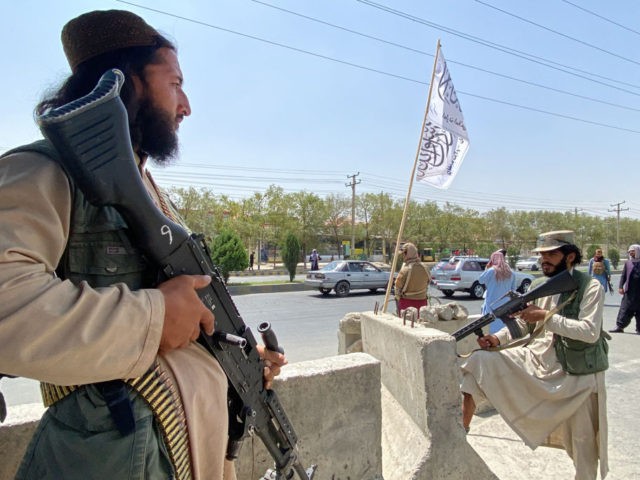The United Kingdom will boost aid spending on Afghanistan, and despite the massive failure to keep billions of dollars’ worth of military equipment out of the hands of the Taliban as they conquered the nation, the government has vowed this money won’t find its way into the hands of the warlords.
British taxpayers will underwrite even more Afghanistan spending in the coming years, the British foreign secretary has said, and the new de facto government of Afghanistan won’t even face the same basic governance and human rights tests the outgoing western-backed regime did in return for this cash.
Touring broadcast studios in London on Tuesday morning, foreign secretary and de facto deputy prime minister Dominic Raab spoke of the government’s plan to use “leverage” to “moderate” the Taliban regime now it has rolled up Afghanistan. Part of that plan, he said, was to increase the UK aid spend by around ten per cent, and to work with international powers to use sanctions.
Foreign Secretary Dominic Raab tells #BBCBreakfast the government is considering a new resettlement scheme for Afghan refugees, adding ‘we are a big hearted nation’. https://t.co/DOUAlISXAa pic.twitter.com/BqCVYwr92X
— BBC Breakfast (@BBCBreakfast) August 17, 2021
Speaking to the BBC, Raab said Britain wanted to try and hold the Taliban to the commitments they made in the 2020 Trump-brokered Doha agreement. While he conceded “I can’t say I trust them to follow through on them”, the foreign secretary nevertheless continued: “I think it’s important through direct and indirect means to be able to engage.
“We will hold the Taliban to the commitments they made in the Doha agreement, commitments never to use their territory as a base for terrorism, to have a more inclusive regime going forwards. They made a range of commitments.”
As for how to hold the Taliban to account, Raab namechecked partners like China and India as potential allies on the UN Sanctions Committee and the UN Security Council, but also paradoxically explained the UK would boost funding to Afghanistan while not simultaneously making access to the money for the Afghan people contingent on the Afghan government behaving itself. He continued: “We will reconfigure our aid budget, we will of course not give the security capacity building money that we previously gave to the government to the Taliban… clearly we wouldn’t want to continue that funding.
“The other thing that we will do is we make sure that we increase our aid budget for development and humanitarian purposes, probably by ten per cent is what I have on mind, on last year. We want to try and make sure it won’t go through the Taliban but we want to alleviate humanitarian suffering.”
Merkel on Biden’s Afghan Fiasco: ‘Everything Seems to Have Been in Vain’, Macron’s Migrant Wave Concernshttps://t.co/Vf8BD3NrZt
— Breitbart London (@BreitbartLondon) August 17, 2021
Underlining his point in a separate interview on Sky News on Tuesday morning, Raab asserted — despite the billions of dollars of Western-made and funded military equipment falling into the lap of the Taliban in recent days now they control Afghanistan — that British taxpayers’ money continuing to flow to Afghanistan definitely wouldn’t end up with the Taliban. He said: “[We will] provide the humanitarian relief the people in Afghanistan need, that’s going to be very challenging, we obviously won’t be giving aid directly to the Taliban. We do want to provide humanitarian relief to the civilian population.”
Until now, British aid going to Afghanistan was conditional on the Afghan government conforming to expectations on good governance, suppressing terrorist groups, and improving the treatment of women in the country. Raab revealed that the jihadist organisation wouldn’t even face the same checks the old western-backed government had, saying: “In terms of aid, in the past — this won’t be possible with the Taliban, at least for the foreseeable future — we had a framework arrangement which pegs what we’re willing to do with standards of governance.
“I expect that to include security — clamping down on terror groups — but also how they treat women and other things we are trying to achieve. That’s in ordinary circumstances what we might do, but that’s not going to be possible for the foreseeable future, I don’t think we will condition the humanitarian relief we provide to ordinary Afghans on what the Taliban does, but what we would say to the Taliban is they have a positive incentive to engage with the previous government — as they have committed, at least notionally to doing.”
The new revelations on Britain’s pragmatic stance towards the Taliban — “they are now in power and we now need to deal with that reality” — follow the disclosure on Monday from Britain’s defence secretary on the degree to which the UK was already engaging in dialogue with the Taliban. Building on that theme, Raab revealed in the course of his discussions on Tuesday how exactly those conversations were taking place, disclosing the before-unnamed Middle East partners as Qatar and Pakistan.
Raab also revealed that the UK had been sending “messages” to the Taliban’s Political Commission based in Doha.
UK Talking to Taliban, Blames Trump, Not Biden, for Afghanistan Chaos https://t.co/N95UbZxxem
— Breitbart London (@BreitbartLondon) August 16, 2021

COMMENTS
Please let us know if you're having issues with commenting.